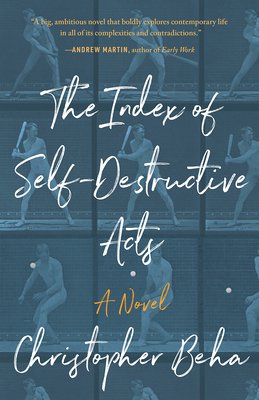
09 Aug Book Review of The Index of Self-Destructive Acts
Review of The Index of Self-Destructive Acts by Christopher Beha
When I first stumbled upon The Index of Self-Destructive Acts, the title and its association with baseball statistics instantly piqued my interest. As someone who appreciates the rich metaphors that sports can bring to life, I was eager to dive into a narrative woven around America’s favorite pastime, crafted by Christopher Beha. Unfortunately, while the book presents itself as an exploration of baseball, it morphs into a weighty examination of personal failings and deeply flawed characters.
At the heart of this tale is Sam Waxworth, a character as frustratingly unlikable as an inning-ending double play. Sam is a quintessential "Real Nice Guy"—if being nice means skating through life on charm while being selfish and utterly complacent. As I read, I found myself oscillating between annoyance and outright irritation at his lack of meaningful engagement with those around him. In fact, I often loathed him more than the book’s designated "villain," Frank. It’s an intriguing achievement when a protagonist makes readers root more for the antagonist out of sheer necessity for emotional relief!
Beha populates The Index of Self-Destructive Acts with an ensemble of secondary characters—Kit, Eddie, Lucy, and Justin—with whom I found far more empathy and regard, even as their arcs veered into dismal territory. These characters, especially the well-meaning Eddie, seem to exist predominantly to suffer, a cycle that left me feeling frustrated. Particularly concerning was Kit’s suffering after a relatively minor transgression that made me ache for her tribulations. Lucy, however, stood as the glimmer of hope, her story arc framed with humor courtesy of her spunky roommates, Krista and Danielle. They provided welcome relief in a narrative heavy with angst, reminding readers that while life is full of self-destructive tendencies, a bit of humor can still shine through.
Beha’s prose is beautifully crafted and the moments when he reaches for baseball analogies are intoxicating, evoking a yearning for more of the game that serves as a backdrop to the characters’ lives. Yet, despite the captivating subject matter intertwined with sports, I found myself longing for tighter pacing. The philosophical tangents and long exchanges often stretched the narrative into what felt like an overlong slog. While deep thoughts about existentialism and personal failure are worthwhile, they sometimes felt like unnecessary filler rather than meaningful exploration.
In a world where readers are constantly bombarded with characters that reflect the best of human nature, Beha has chosen to delve into the darker psyche of self-destructive personalities. The challenging nature of this book means it won’t resonate with everyone. Those looking for a feel-good tale or a straightforward sports story may find themselves disillusioned. However, if you enjoy character studies that grapple with complexity and moral ambiguity, The Index of Self-Destructive Acts provides a rich terrain to explore.
In conclusion, while my reading experience with Beha’s novel was polarized—drawn in by potential yet ultimately frustrated by pacing and character flaws—I appreciate the deeper exploration of human failing. If you’re someone who relishes a hefty examination of life’s darker chapters presented with poetic prose, this book might just be the right fit for you. As for me, it’s a reminder that not all stories about the diamond end with a home run.
Discover more about The Index of Self-Destructive Acts on GoodReads >>









